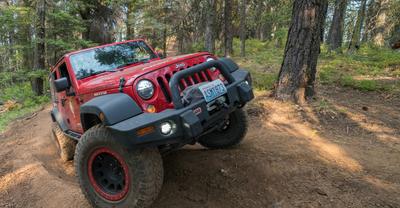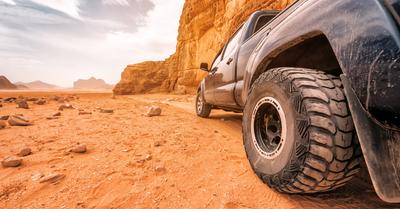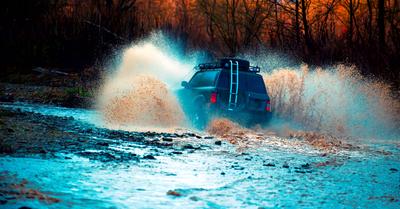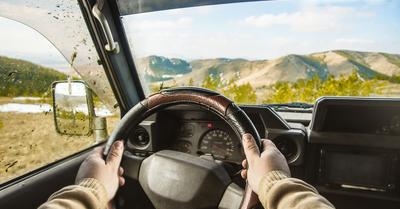Off-road adventures can happen anywhere, but states require these vehicles to meet certain expectations, causing riders to ask if they have or need titles.
Off-road vehicles have titles, and many states require one to legally operate, buy, or sell the vehicle. ATVs and UTVs only need titles in some states, but dirt bikes and off-road trucks like Jeeps need a title. This is a legal ownership document required to register the OHV properly.
Titles are essential for many vehicles, but off-road ones are unique and work differently. To better understand how off-road vehicle titles work, we have created this guide with an in-depth explanation for readers below. All information is gathered from state DMV websites, so all legal policies are currently enforced.
Key Takeaways
- Off-road vehicles have titles, but not all states require ATV or UTV owners to have a title to legally drive through off-road terrains and trails.
- The four most common OHVs include ATVs, UTVs, OHV motorcycles, dirt bikes, and Jeeps or other off-road trucks.
- Not all newly purchased off-road vehicles come with a title. When they are purchased from a dealer, a title is included, but private sales may or may not include a title acquired from the previous owner.
This article may contain affiliate links where we earn a commission from qualifying purchases.
Do Off-Road Vehicles Have Titles?
Generally, off-road vehicles like ATVs do have titles. But the exact requirements depend on several factors, including the type of off-road vehicle, state laws and regulations, and the vehicle's intended use.
The title process is not complex, which is why many states require one for an ATV to ride off-road, This makes it easier to register and insure the vehicle too. This protects the state, makes it easier to insure the vehicle, and protects public safety.
It’s also standard practice for a new ATV to come with a title when the purchase is done with a certified dealer. Every ATV should have a VIN number and a title too.
If the vehicle doesn't have a title, it’s a cause for concern and may be a sign to avoid buying it. This should be one of the first questions asked by a prospective buyer to an ATV or UTV seller.
There are a few different primary off-highway vehicle types too. Most do have titles, but some rare scenarios need to be mentioned when they don't.
What Are The Different Types Of Off-Highway Vehicles?
Off-highway vehicles (OHVs), which are designed for use on rough terrains such as dirt, sand, or mud, come in various styles. The most common types of OHVs are listed below and all of these typically do need a title.
ATVs
All-terrain vehicles (ATVs) are the smallest and most used off-road vehicles. These are vehicles designed for adventure and rated as the most popular OHV type. But because they are versatile and easy to use, not every state requires a title for ownership.
They are not typically allowed on any streets or highways unless made street-legal with critical modifications. ATVs can be used for fun trail riding, adventure or as utility vehicles to help do farm or yard work.
UTVs
Utility-terrain vehicles (UTVs) are similar to ATVs regarding registration stickers, basic liability insurance, and title certificates. The policy enforced for ATVs is basically the same in each state.
They are commonly used for work-related reasons rather than off-road exploration. They have cargo beds and multiple seats and work well on farms because of the hauling capacity provided.
Jeeps & Trucks
Any Jeep or truck will come with a title. This is a legal requirement for all vehicles, but when they are used off-road, additional documents must be considered.
This ownership document can be used to obtain the off-highway vehicle registration. Not all states require this, so contact the local county treasurer's office first to see what is needed for the Jeep to go off-road.
Dirt Bikes & Motorcycles
Dirt bikes and off-road motorcycles are one of the most used off-highway vehicles. These are two-wheeled and lightweight with a specific design for rough terrain use.
They are frequently used for racing or leisure riding. Typically, the bike will either come with a title or the new owner needs to apply for a title and registration for off-road use.
In most states, this is known as an OHV card. This card makes it legal to use this vehicle in specific off-road areas within the state.
What Is An Off-Road Vehicle Title?
The title of a vehicle, including off-road ones, is a legal form of paperwork indicating ownership of the vehicle. This is why when a vehicle gets sold, the title is typically transferred to the new owner so they can legally drive it or sell it again in the future.
Every title will include key pieces of information about the vehicle. This includes the following:
- VIN
- Make
- Model
- Plate Number (If needed)
- Vehicle year
- Vehicle owner information
- Title Number
- Taxation Information
A title can be obtained for a brand-new off-road vehicle by registering it at the local DMV. This requires some paperwork based on individual state laws.
Are Off-Road Vehicles Required To Have Titles?
State laws and regulations influence whether an off-road vehicle requires a title. In some states, all off-road vehicles must be titled, but there are a few exceptions based on location, vehicle type, or intended vehicle use.
Owners of off-road vehicles should become familiar with their state's laws and regulations, as failure to do so can result in fines and other penalties. We have created this chart below with the requirements in each state.
Do All Off-Road Vehicles Come With Titles?
Anytime someone buys an off-road vehicle like an ATV or a dirt bike, a bill of sale should be included with the transaction. This is critical because if the vehicle is not titled, the bill of sale is used to get one.
All transactions with a certified dealer will include a title. But many private party sales will not include a title because the previous owner likely didn’t register the vehicle properly with the state.
ATVs without one will require titling, depending on the vehicle's model year. Operating the vehicle in public off-road places is risky without a title because it could lead to a fine or a ticket.
We recommend all buyers ask about a title before purchasing. It’s best to buy a vehicle with a title to transfer it simply, but it’s not always possible.
Do Off-Road Vehicles All Have A Vehicle Identification Number?
Every off-road vehicle comes with a vehicle identification number. The VIN is a 17-digit code used to obtain proper insurance, a certificate of title, and other crucial documents to operate the vehicle legally.
The VIN is needed to identify and track vehicles. It allows us to get our registration and look online for more information about the vehicle’s history and whether there are any liens or reports about the vehicle.
This includes showing the earliest records for the vehicle. It’s always good to verify the VIN and confirm the vehicle is clean before making a purchase.
The number one reason people use a VIN number is to find out if they are driving a stolen ATV. It’s rare but still possible for this to happen when making a private sale.
How Do You Obtain A Title For An Off-Road Vehicle?
Once we understand how off-road vehicle titles work, we must go through the necessary steps to obtain one. Below, we have listed exactly how to get a title for an ATV or UTV.
Gather Necessary Documents
Getting a title for an off-road vehicle is similar to a regular vehicle. A trip to the DMV is needed, but first, all paperwork must be brought in for review.
This may include the vehicle's registration, bill of sale, and any other documents that the state's DMV requires. The best thing to do is look online on the DMV website or call and ask what is required.
Contact & Visit The DMV
We need to call or visit the DMV, or we check online on the DMV's website to complete the title application process. In most states, appointments are also available to avoid a long wait when we arrive.
Pay Required Fees
It’s also required to pay any fees and costs associated with obtaining a title. These may include a title fee, sales tax, and any other charges that are required by your state.
After fees get paid, the certificate of title will be issued for the vehicle. This is the final step before getting the title issued for the vehicle.
How To Get An ATV Registered
The ATV title and registration laws vary by state, but many states require owners to register the ATV. They are treated like traditional motor vehicles, and many of the same laws apply despite the different use cases.
This is true for both a new and used ATV. To start this process, follow these steps, so the ATV is legal and ready to hit the roads for some adventure.
Acquire All Necessary Documents
First, we need to get all of the documents to register an ATV. Almost all new ATVs will only come with a title and a VIN, so we are responsible for everything else, including paperwork and the registration sticker.
We also need to inquire about basic liability insurance for an ATV. This is a requirement in most states for all ATVs. If we are unsure about the exact documentation needed, we can contact the DMV to find out.
Contact The DMV
When we contact the DMV about registering an ATV, we should have a list of questions ready for them to answer. First, we should learn about where an ATV is legally allowed to drive in the state.
As long as we have basic ownership documents like the bill of sale, we should have no issue registering the ATV. Make note of everything they need from us so we can get it done in one visit to their office.
Consider Street Legal Laws
Next, we can consider if we want to make our ATV legal for highway use too. This will require various updates to the ATV, including a blinker kit, headlights, taillights, seat belts, and other similar adjustments.
If we decide this is something we want, the best thing to do is visit a local ATV shop to pick up these accessories and get them installed.
Get ATV Inspection
After this is complete, it’s time to inspect the ATV to ensure it’s ready for off-road and highway use. Not all states require an inspection, but some do before issuing the new registration.
Start Riding
Finally, we can start riding the ATV legally. This protects us if we ever get pulled over, so we would avoid getting fined.









